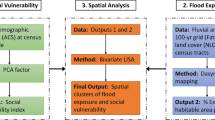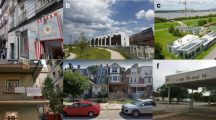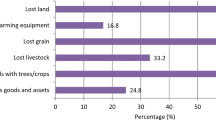Abstract
This study explores the impact of Boko Haram’s violence on northern Nigeria, particularly focusing on the willingness of conflict-induced internally displaced persons (CIIDPs) to return home and the role of restoring social infrastructure in this process. We employed a mixed-methods approach, collecting data from 866 randomly selected internally displaced persons (IDPs) across eight camps in North-East Nigeria and conducting focus group discussions in two of these camps. Our findings, as revealed by correlation analysis, suggest a positive albeit weak link between the restoration of social infrastructure and the willingness of IDPs to return to their homes. Specifically, the selected social infrastructure improvements accounted for a modest 3% change in the willingness to accept a voluntary return. This implies that while restoring social infrastructure plays a role, it alone is insufficient to significantly boost the willingness of IDPs in North-East Nigeria to return voluntarily. However, our regression analysis offers more nuanced insights. It indicates that restoring access to water and rebuilding access roads in affected communities can have a substantial impact on motivating CIIDPs to return home. Therefore, we conclude that while restoring social infrastructure is a factor, it should not be viewed as the sole solution for promoting willingness to return in a post-conflict context. To address the broader issue, we recommend that governments and policymakers in conflict-affected communities prioritize the restoration of water sources and access roads, as these appear to be critical factors in encouraging the return of IDPs. Additionally, further research is necessary to identify other essential needs and interventions to facilitate the return of CIIDPs to their home communities.

Similar content being viewed by others
Data Availability
The datasets generated and analyzed during the study are available from the online repository Figshare, titled “Adekola_PhD Dataset Raw Data.sav” at https://doi.org/https://doi.org/10.6084/m9.figshare.12044349.v1.
Code Availability
Not applicable.
References
Abebe, S. T., Dagnew, A. B., Zeleke, V. G., Eshetu, G. Z., & Cirella, G. T. (2019). Willingness to pay for watershed management. Resources, 8(2), e77. https://doi.org/10.3390/resources8020077
Adekola, P. O., Azuh, D. E., Adeloye, D., & Amoo, E. (2019a). Urban renewal in Nigeria: A slash and burn approach? Environment, Development and Sustainability, 21(5), 2165–2182. https://doi.org/10.1007/s10668-018-0130-2
Adekola, P. O., Azuh, D., Amoo, E. O., & Brownell, G. (2019b). Restoration of water supply in post-conflict communities in Nigeria and sustainable reintegration. International Journal of Civil Engineering & Technology, 10(2), 191–201.
Adekola, P. O., Azuh, D., & Amoo, E. O. (2019c). Restoration of power supply to post-conflict communities in Northern Nigeria: Implication for sustainable reintegration of returning migrants,. IOP Conference Series Journal of Physics Conf Series, 1299(19), e2023. https://doi.org/10.1088/1742-6596/1299/1/012023
Adekola, P. O., Iyalomhe, F. O., Paczoski, A., Abebe, S. T., Pawłowska, B., Bąk, M., & Cirella, G. T. (2021). Public perception and awareness of waste management from Benin City. Scientific Reports, 11(1), e306. https://doi.org/10.1038/s41598-020-79688-y
Adekola, P. O., Azuh, D. E., Amoo, E. O., Brownell, G., & Cirella, G. T. (2022). Economic drivers of voluntary return among conflict-induced internally displaced persons in Nigeria. Sustainability, 14(4), e2060. https://doi.org/10.3390/su14042060
Afolabi, A. O., Oluwatayo, A., Oyeyipo, O., Ojelabi, R., & Fagbenle, O. (2018). Assessment of designers’ perception of post conflict housing schemes for internally displaced persons. Construction Economics and Building, 18(1), 27–47. https://doi.org/10.5130/AJCEB.v18i1.5780
Basnet, S., Kandel, P., & Lamichhane, P. (2018). Depression and anxiety among war-widows of Nepal: A post-civil war cross-sectional study. Psychology, Health and Medicine, 23(2), 141–153. https://doi.org/10.1080/13548506.2017.1338735
Benito-López, B., del Moreno-Enguix, M. R., & Solana-Ibañez, J. (2011). Determinants of efficiency in the provision of municipal street-cleaning and refuse collection services. Waste Management, 31(6), 1099–1108. https://doi.org/10.1016/j.wasman.2011.01.019
Borges, G. M. (2023). Journey of violence: Refugee women’s experience across three stages & places. Journal of International Migration and Integration. https://doi.org/10.1007/s12134-023-01102-z
Bove, V., Salvatore, J. D., & Elia, L. (2022). What it takes to return: UN peacekeeping and the safe return of displaced people. SSRN Scholarly Paper, 4149220, 1–39. https://doi.org/10.2139/ssrn.4149220
Boyce, P. R. (2019). The benefits of light at night. Building and Environment, 151, 356–367. https://doi.org/10.1016/j.buildenv.2019.01.020
Bozzoli, C., Brück, T., & Muhumuza, T. (2012). Movers or stayers? Understanding the drivers of IDP camp decongestion during post-conflict recovery in Uganda. SSRN Scholarly Paper, 2030822, 1–40. https://doi.org/10.2139/ssrn.2030822
Brownell, G., & Basham, R. (2017). NGO strategy toward the reintegration of child soldiers in Liberia, Africa: An online survey of services, roles, and activities. International Social Work, 60(5), 1074–1086. https://doi.org/10.1177/0020872817704278
Brownell, G. (2015). The reintegration experiences of ex-child soldiers in Liberia. University of Texas at Arlington, Doctoral Thesis. https://humantraffickingsearch.org/wp-content/uploads/2017/07/Brownell_uta_2502D_12501.pdf. Accessed 30 Nov 2023.
BSMH. (2019). Empirical facility survey. Borno State Ministry of Health: Maiduguri.
Chimni, B. S. (2002). Refugees, return and reconstruction of “post-conflict” societies: A critical perspective. International Peacekeeping, 9(2), 163–180. https://doi.org/10.1080/714002734
Cirella, G. T., Iyalomhe, F. O., Jensen, A., & Akiyode, O. O. (2018). Exploring community of practice in Uganda’s public sector: Environmental impact assessment case study. Sustainability, 10(7), e2502. https://doi.org/10.3390/su10072502
Cirella, G. T., & Iyalomhe, F. O. A. (2019). Determinants of flooding and strategies for mitigation: Two-year case study of Benin City. Geosciences, 9, e136. https://doi.org/10.3390/geosciences9030136
Crisp, J. (2000). Africa’s refugees: Patterns, problems and policy challenges. UNHCR. https://www.refworld.org/docid/4ff582482.html. Accessed 30 Nov 2023.
Dercon, S., & Ayalew, D. (1998). Where have all the soldiers gone: Demobilization and reintegration in Ethiopia. World Development, 26(9), 1661–1675. https://doi.org/10.1016/S0305-750X(98)00077-1
Dorigo, G., & Tobler, W. (1983). Push-pull migration laws. Annals of the Association of American Geographers, 73(1), 1–17.
Dowd, C., & Drury, A. (2017). Marginalisation, insurgency and civilian insecurity: Boko Haram and the Lord’s resistance army. Peacebuilding, 5(2), 136–152. https://doi.org/10.1080/21647259.2016.1277011
De Berry, J. P., & Roberts, A. J. (2018). Social cohesion and forced displacement: A desk review to inform programming and project design. World Bank. https://documents.worldbank.org/en/publication/documents-reports/documentdetail/125521531981681035/social-cohesion-and-forced-displacement-a-desk-review-to-inform-programming-and-project-design. Accessed 30 Nov 2023.
Danish Refugee Council [DRC]. (2022). Global displacement forecast 2022. Danish refugee council: Copenhagen. https://pro.drc.ngo/media/hfwi5qtw/drc-global-displacement-forecast-report-2022-1.pdf. Accessed 30 Nov 2023.
Dunford, M., & Li, L. (2011). Earthquake reconstruction in Wenchuan: Assessing the state overall plan and addressing the ‘forgotten phase.’ Applied Geography, 31(11), 998–1009. https://doi.org/10.1016/j.apgeog.2011.01.001
Eastmond, M. (2006). Transnational returns and reconstruction in post-war Bosnia and Herzegovina. International Migration, 44(3), 141–166. https://doi.org/10.1111/j.1468-2435.2006.00375.x
Ekpa, S., & Md Dahlan, N. H. (2015). Towards the evolution of right to reparation for loss of housing and property of internally displaced persons (IDPs) in Nigeria. Mediterranean Journal of Social Sciences, 6(3), 380–386. https://doi.org/10.5901/mjss.2015.v6n3p380
Federal Republic of Nigeria. (2012). National policy on internally displaced persons (IDPs) in Nigeria. Abuja, Nigeria: FRN.
Gao, H., Bohn, T. J., Podest, E., McDonald, K. C., & Lettenmaier, D. P. (2011). On the causes of the shrinking of Lake Chad. Environmental Research Letters, 6(3), e034021. https://doi.org/10.1088/1748-9326/6/3/034021
Hagerstrand, T. (1957). Migration and area. In Migration in Sweden. In D. Hannerberg (Ed.), Lund Studies in Geography, No. 13 (pp. 17–128). Lund, Sweden: Lund University Press.
Haruna, A. (2020). Borno governor re-allocates 100 abandoned houses to IDPs. https://www.premiumtimesng.com/regional/nnorth-east/396801-borno-governor-re-allocates-100-abandoned-houses-to-idps.html. Accessed 30 Nov 2023.
Hoffmann, E. M., Konerding, V., Nautiyal, S., & Buerkert, A. (2019). Is the push-pull paradigm useful to explain rural-urban migration? A case study in Uttarakhand. India. Plos One, 14(4), e0214511.
Iaria, V. (2012). Attempting return: Iraqis’ remigration from Iraq. Refuge, 28(1), 109–121. https://doi.org/10.25071/1920-7336.36093
International Committee of the Red Cross [ICRC]. (2016). International Committee of the Red Cross: Nigeria, assistance to IDPs. https://ihl-in-action.icrc.org/case-study/nigeria-assistance-idps. Accessed 30 Nov 2023.
Internal Displacement Monitoring Centre [IDMC]. (2022). Displacement data: Nigeria. Internal Displacement Monitoring Centre: Geneva. https://www.internal-displacement.org/countries/nigeria. Accessed 30 Nov 2023.
International Organization for Migration [IOM]. (2015). Assisted voluntary return and reintegration: At a glance. Grand-Saconnex, Switerland: International Organization for Migration.
International Organization for Migration [IOM]. (2016). Displacement tracking matrix (DTM), Nigeria round 11 report: International Organization for Migration. http://nigeria.int/dtm. Accessed 30 Nov 2023.
International Organization for Migration [IOM]. (2018). All site profile of IDPs camps—Adamawa, Bornu, and Yobe States: International Organization for Migration. https://displacement.iom.int/nigeria. Accessed 30 Nov 2023.
International Organization for Migration [IOM]. (2021). The assisted voluntary return and reintegration program: Migrant info—European Commission. https://www.migrant.info.pl/the-assisted-voluntary-return-and-reintegration-program.html. Accessed 30 Nov 2023.
Jacob, J. U. U., & Akpan, I. (2015). Silencing Boko Haram: Mobile phone blackout and counterinsurgency in Nigeria’s Northeast region. Stability, 4(1), 1–17. https://doi.org/10.5334/sta.ey
Kaplan, O., & Nussio, E. (2015). Community counts: The reintegration of ex-combatants in Colombia. Conflict Management and Peace Science, 1, 1–22. https://doi.org/10.1177/0738894215614506
Khalid, B., & Urbański, M. (2021). Approaches to understanding migration: A multi-country analysis of the push and pull migration trend. Economics & Sociology, 14(4), 242–267.
Lee, E. (1966). A theory of migration. Demography, 3(1): 47–57. Retrieved from http://www.jstor.org/stable/2060063. Accessed 30 Nov 2023.
Lischer, S. K. (2007). Causes and consequences of conflict-induced displacement. Civil Wars, 9(2), 142–155. https://doi.org/10.1080/13698240701207302
Maya-Jariego, I., La Peña-Leiva, A. D., Arenas-Rivera, C., & Alieva, D. (2019). Personal networks, social media, and community cohesion in the strategies of peace-building agents in Colombia to counteract the segregation of displaced populations. Journal of Community Psychology, 47(6), 1300–1312. https://doi.org/10.1002/jcop.22173
Mohammadi, A., Abbasi-Shavazi, M. J., & Sadeghi, R. (2018). Return to home: Reintegration and sustainability of return to post-conflict contexts. In Hugo G., Abbasi-Shavazi M., & Kraly E. (Eds.), Demography of Refugee and Forced Migration (pp. 251–270). Springer: Berlin. https://doi.org/10.1007/978-3-319-67147-5_13
Mujeeb, A., & Zubair, A. (2012). Resilience, stress, anxiety and depression among internally displaced persons affected by armed conflict. Pakistan Journal of Social and Clinical Psychology, 9(3), 20. https://www.questia.com/read/1P3-2955075201/resilience-stress-anxiety-and-depression-among-internally. Accessed 30 Nov 2023.
Musa, M. A., & Liberty, S. M. (2019). Social cohesion and reintegration among internally displaced persons (IDPs) in selected local government areas in Borno State. Global Journal of Political Science and Administration, 7(4), 30–46.
Muggah, R. (2009). Security and Post-Conflict Reconstruction. Routledge.
Mwamakamba, S. N., Sibanda, L. M., Pittock, J., Stirzaker, R., Bjornlund, H., van Rooyen, A., Munguambe, P., Mdemu, M. V., & Kashaigili, J. J. (2017). Irrigating Africa: Policy barriers and opportunities for enhanced productivity of smallholder farmers. International Journal of Water Resources Development, 33(5), 824–838. https://doi.org/10.1080/07900627.2017.1321531
Nigerian Finder. (2023). Population of Nigeria by states, 2023 estimates. https://nigerianfinder.com/population-of-nigeria-by-states/. Accessed 30 Nov 2023.
Nyako, A. M. (2015). Concept note on north-east development commission: An institutional framework for a sustainable solution to the North-East national security challenge. Statehouse Government of Nigeria: Abuja.
Obikaeze, V. C., & Onuoha, C. B. (2016). The Nigerian-state and management of internally displaced persons (IDPs) from 2012–2016. African Journal of Politics and Society, 6(4), 4–21.
Ohiorhenuan, J. F. (2011). Post-conflict recovery: Approaches, policies and partnerships. Centre for Research on Peace and Development, Leuven, 3, 1–10.
Ojo, A. (2017). The road to recovery: challenges of reintegrating internally displaced persons (IDPs) in Northern Nigeria. https://www.developafrica.org/blog/road-recovery-challenges-reintegrating-internally-displaced-persons-idps-northern-nigeria. Accessed 30 Nov 2023.
Olanrewaju, F. O., Olanrewaju, A., Omotoso, F., Alabi, J. O., Amoo, E., Loromeke, E., & Ajayi, L. A. (2019). Insurgency and the invisible displaced population in Nigeria: A situational analysis. SAGE Open, 9(2), e4620. https://doi.org/10.1177/2158244019846207
Ologun, O. (2020). Catholic church builds mosque, houses for Muslim IDPs in Yola. https://newsdigest.ng/yola-catholic-church. Accessed 30 Nov 2023.
Omenma, J. T., Onyishi, I. E., & Okolie, A. M. (2020). A decade of Boko Haram activities: The attacks, responses and challenges ahead. Security Journal, 33(3), 337–356. https://doi.org/10.1057/s41284-020-00231-9
Omenma, J. T., Onyishi, I. E., & Okolie, A. M. (2023). A decade of Boko Haram activities: The attacks, responses and challenges ahead. In Omenma, J. T., Onyishi, I. E., & Okolie, A. M. (Eds.), Ten years of Boko Haram in Nigeria (pp. 337–356). Palgrave Macmillan: Cham. https://doi.org/10.1007/978-3-031-22769-1_1
Oppenheim, B., Steele, A., Vargas, J. F., & Weintraub, M. (2015). True believers, deserters, and traitors: Who leaves insurgent groups and why. Journal of Conflict Resolution, 59(5), 794–823. https://doi.org/10.1177/0022002715576750
Phrasisombath, K. (2009) Sample size and sampling methods. Faculty of Postgraduate Studies and Research University of Health Sciences, Vientiane. Available online: https://www.gfmer.ch/Activites_internationales_Fr/Laos/PDF/Sample_size_methods_Phrasisombath_Laos_2009.pdf. Accessed 30 Nov 2023.
Phrasisombath, K., Faxelid, E., Sychareun, V., & Thomsen, S. (2012). Risks, benefits and survival strategies-views from female sex workers in Savannakhet, Laos. BMC Public Health, 20(12), 1004. https://doi.org/10.1186/1471-2458-12-1004
Population Reference Bureau [PRB]. (2022). World population data sheet 2022. Population Reference Bureau. https://interactives.prb.org/2022-wpds/. Accessed 30 Nov 2023.
Rafiq, M., Hassan, A. A. G., & Saeed, M. (2022). Perceptions of returnees concerning their rehabilitation and reinstatement in Swat District, Pakistan: An evaluative study. Journal of Population and Social Studies, 30, 354–376.
Ravenstein, E. (1885). The laws of migration. Journal of the Statistical Society, 48, 167–235.
Reilly, R., & Risser, G. (2000). Return, resettlement and reintegration: Application of the guiding principles on internal displacement in Asia. Refugee Survey Quarterly, 19(2), 170–190. https://doi.org/10.1093/RSQ/19.2.170
Rockström, J., & Falkenmark, M. (2015). Agriculture: Increase water harvesting in Africa. Nature, 519(7543), 283–285. https://doi.org/10.1038/519283a
Sliwa, M., & Wiig, H. (2016). Should I stay or should I go: The role of Colombian free urban housing projects in IDP return to the countryside. Habitat International, 56, 11–19. https://doi.org/10.1016/j.habitatint.2016.01.003
Stoddard A., Harvey P., Czwardo M., & Breckendridge, M. J. (2020). Humanitarian access SCORE report on Northeast Nigeria: Survey on the coverage, operational reach, and effectiveness of humanitarian aid. https://www.humanitarianoutcomes.org/SCORE_report_NE_Nigeria_2020. Accessed 30 Nov 2023.
Sundberg, R. (2020). UN Peacekeeping and forced displacement in South Sudan. International Peacekeeping, 27(2), 210–237. https://doi.org/10.1080/13533312.2019.1676642
Uchechukwu, I. (2020). Ayade hands over 52 housing units to Bakassi IDPs widows. https://www.vanguardngr.com/2020/05/ayade-hands-over-52-housing-units-to-bakassi-idps-widows/. Accessed 30 Nov 2023.
UNDP. (2019). Human Development Index 2019: United Nations Development Programme. http://www.hdr.undp.org/en/2019-report. Accessed 30 Nov 2023.
Unguren, E., Tekin, O. A., & Bayırlı, M. (2021). Exploring the effect of push and pull motivation factors on destination satisfaction: Empirical evidence from amenity migration perspectives. European Journal of Tourism Research, 28, e2811.
United Nations High Commission for Refugees [UNHCR]. (2022). UNHCR global trends: Forced displacement in 2021. United Nations High Commission for Refugees: Copenhagen. https://www.unhcr.org/publications/brochures/62a9d1494/global-trends-report-2021.html
United Nations High Commission for Refugees [UNHCR]. (2023). Refugee data finder: 103 million forcibly displaced people worldwide, United Nations High Commission for Refugees: Geneva. https://www.unhcr.org/refugee-statistics/
UNOCHA. (2015). Nigeria: North-East crisis situation report no. 1. Office for the Coordination of Humanitarian Affairs: Abuja.
UNOCHA. (2022). Nigeria: North-East humanitarian operational presence (January-March 2022). UN Office for the Coordination of Humanitarian Affairs: New York. https://www.humanitarianresponse.info/sites/www.humanitarianresponse.info/files/documents/files/jan_mar_2022_ocha_nga_3w_ongoing_humanitarian_activities.pdf. Accessed 30 Nov 2023.
Urbański, M. (2022). Comparing push and pull factors affecting migration. Economies, 10(1), e21.
Vanguard. (2022). North-East Development Commission Earmarks N31.01. https://www.vanguardngr.com/2022/09/nedc-earmarks-n31-01-trillion-to-stabilise-develop-north-east. Accessed 30 Nov 2023.
Vasey, K. (2012). Place-making, provisional return, and well-being: Iraqi refugee women in Australia. Refuge, 28(1), 25–35. https://doi.org/10.25071/1920-7336.36086
Weber, S., & Hartman, A. (2022). Property rights and post-conflict recovery: Theory and evidence from IDP return movements in Iraq. Working paper available at: https://www.sigridweber.com/files/IDP_property_return.pdf. Accessed 30 Nov 2023.
Weeraratne, S. (2017). Theorizing the expansion of the Boko Haram insurgency in Nigeria. Terrorism and Political Violence, 29(4), 610–634. https://doi.org/10.1080/09546553.2015.1005742
Woodhouse, P., Veldwisch, G. J., Venot, J. P., Brockington, D., Komakech, H., & Manjichi, Â. (2017). African farmer-led irrigation development: Re-framing agricultural policy and investment? Journal of Peasant Studies, 44(1), 213–233. https://doi.org/10.1080/03066150.2016.1219719
Yerima, H., & Singh, D. (2017). Insurgency in Nigeria: The Perspectives on Health Care Delivery to Gender Affected Victims Amongst IDPs. IOSR Journal in Humanities and Social Science, 22, 35–41. https://doi.org/10.9790/0837-2205033541
Zieba, F., Yengoh, G., & Tom, A. (2017). Seasonal Migration and Settlement around Lake Chad: Strategies for Control of Resources in an Increasingly Drying Lake. Resources, 6(3), 41. https://doi.org/10.3390/resources6030041
Žíla, O. (2019). After coming home: Forms and meanings of return in Dayton’s Bosnia and Herzegovina. Glasnik Etnografskog Instituta SANU, 67(3), 523–546. https://doi.org/10.2298/GEI1903523Z
Acknowledgements
The authors would like to thank the field assistants who helped conduct the research in North-East, Nigeria as well as the Department of Population, Family, and Reproductive Health, School of Public Health, University of Medical Sciences, Ondo City, Nigeria.
Funding
The fieldwork was partially funded by the University of Medical Sciences, Ondo City, Nigeria. This research project was partially funded by the Polo Center of Sustainability as part of the EMS-Nigeria-101-2023A project.
Author information
Authors and Affiliations
Contributions
Conceptualization, writing of the original draft preparation, and funding acquisition: A.P.O.; formal analysis and investigation: A.P.O. and G.T.C.; methodology, writing—review and editing of the final draft: A.P.O., G.T.C., and G.B.
Corresponding author
Ethics declarations
Ethics Approval
The University of Gdansk Ethical Committee at the University of Gdansk in Gdansk, Poland, has rigorously assessed this study’s adherence to the ethical standards outlined in the Declaration of Helsinki and other relevant ethical guidelines and laws applicable in both Nigeria and the European Union. Furthermore, the University of Medical Sciences Research Ethics Committee has undertaken an exhaustive review of the study documents and, after a formal approval process facilitated by the Institutional Review Board office, has officially certified its approval.
Consent to Participate
Respondents volunteered to participate autonomously without their identity being recorded. Informed consent was obtained from all the participants in the study via the University of Medical Sciences Research Ethics Committee, Ondo City, Nigeria. Consent to participate was voluntary and approved by the University of Gdansk Ethical Committee, University of Gdansk, Gdansk, Poland.
Consent for Publication
Not applicable.
Conflict of Interest
The authors declare no competing interests.
Additional information
Publisher's Note
Springer Nature remains neutral with regard to jurisdictional claims in published maps and institutional affiliations.
Appendix
Rights and permissions
Springer Nature or its licensor (e.g. a society or other partner) holds exclusive rights to this article under a publishing agreement with the author(s) or other rightsholder(s); author self-archiving of the accepted manuscript version of this article is solely governed by the terms of such publishing agreement and applicable law.
About this article
Cite this article
Adekola, P.O., Cirella, G.T. & Brownell, G. Reintegration Programs and the Willingness of Displaced Persons to Return Home: Analyzing the Role of Social Infrastructure in North-East Nigeria. Int. Migration & Integration (2024). https://doi.org/10.1007/s12134-024-01128-x
Accepted:
Published:
DOI: https://doi.org/10.1007/s12134-024-01128-x




